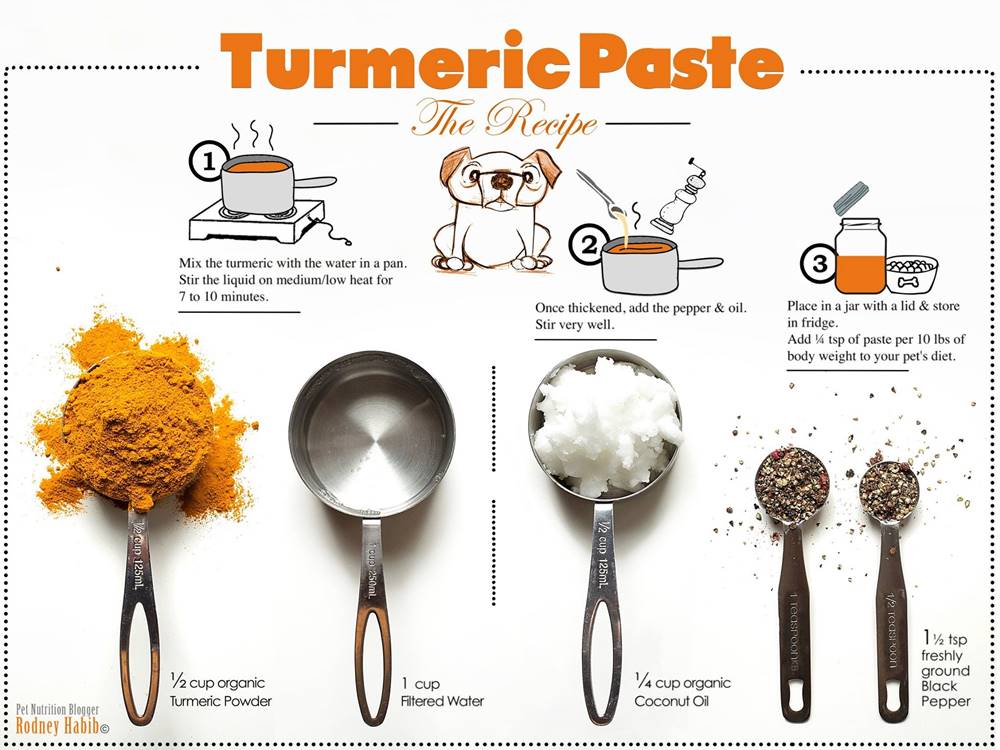Laurie's Blogs.
Apr 2017
Turmeric & Curcumin - Considerations & Safety

Here's what your patients are 'cooking up' for their dog at home. But you should know more!
In this blog, I was intending to do a review of a review paper on Turmeric / Curcumin. However, the idea was just as dumb as it sounded. How do you do a review of a review? Doh! So instead, I thought I’d pass along some highlights and then direct you to the original source! Now that’s a plan! Thank you so much to Dr. Veerle Dejonckheere, MRCVS for directing me to this wonderful paper that she wrote for the ACPAT Journal, FourFront.
Now let’s begin:
Curcumin is a compound derived from Turmeric. Curcumin has an excellent safety profile, but one should consider the possible interactions and side effects when advising dog owners who are supplementing with curcumin.
In Eastern Medicine (Ayruvedic medicine in particular), curcumin is used for the treatment of skin disorders, pulmonary and gastrointestinal ailments, pain, wounds and liver disorders. Curcumin is widely being used by pet owners as an adjunctive treatment for osteoarthritis.
Components:
Turmeric is more than just curcumin, and some of the beneficial effects of turmeric are not solely related to the curcumin extract.
Bioavailability:
Curcumin is poorly absorbed. It isn’t soluble in water. It is rapidly metabolized and eliminated. Dissolving curcumin in oil before ingestion allows it to be absorbed by the lymphatic system.
Piperine (a component found in black pepper) may also enhance the bioavailability.
PLGA (https://en.wikipedia.org/wiki/PLGA) may also improve the relative bioavailability and increase the half-life of curcumin.
Encapsulating curcumin in absorbable substances is important for getting any benefits from the product – read the paper for more info here!
Safety Considerations:
1.Inhibition of drug metabolism (some in particular include digoxin, anticoagulants, cyclosporine, and NSAIDS).
2.Iron Chelation – Rodents feed diets low in iron but supplemented with curcumin caused iron deficiency.
3.DNA Damage – A rodent study found more carcinogenic activity in the small intestine with the supplementation of curcumin. However, there is a low incidence of GI cancers in India (a country with a diet rich in curcumin).
4.Gastrointestinal Inflammation – Curcumin has been associated with nausea, diarrhoea and increases in alkaline phosphatase and lactate dehydrogenase. Clinically, dogs with existing GI issues tend to suffer adverse reactions with the introduction of curcumin.
5.Gall Bladder Contraction – As such, dogs with known gall bladder issues should avoid curcumin. However, curcumin has the potential to decrease the formation of gallstones. So, it might be used preventatively, but not in the face of pre-existing gallstones.
6.Hypoglycaemia enhancement – which means, monitor diabetic patients who are concurrently taking curcumin more closely.
7.Anti-coagulant properties – have been reported in zingiberaceae extracts (remember when we said that Turmeric had more than just curcumin in it?), as such beware of its use in animals with clotting disorders.
8.Oxalate uroliths – Susceptible individuals may have an increased risk of kidney stones.
9.Stop the cat pee smell by adding cinnamon!
Anti-inflammatory activity
Curcumin has been shown to decrease synthesis of inflammatory mediators, demonstrates selective inhibition of COX-2 and some COX-1 enzymes, and may reduce signal transduction pathways involved in inflammatory diseases & various cancers.
Now, check out the paper for the full details, the background information, and the references!
http://integratedveterinarycare.co.uk/herbal-medicine.html
Cheers!
Laurie


